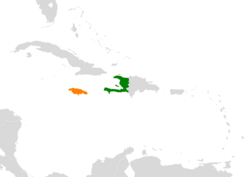 | |
Haiti | Jamaica |
|---|---|
Haiti and Jamaica have bilateral relations. Both nations have honorary consulates in their respective capitals.
Since Haiti's independence in 1804, Jamaica has been a frequent destination for exiled former Haitian leaders and politicians, starting with the 3rd president, Charles Rivière-Hérard.
In January 2007, Haitian President René Préval made a four-day working visit to Jamaica. At a press conference, Jamaican Prime Minister Portia Simpson Miller announced that a Joint Jamaica/Haiti Commission would be convened later that year. [1]
The two countries share a maritime boundary.

